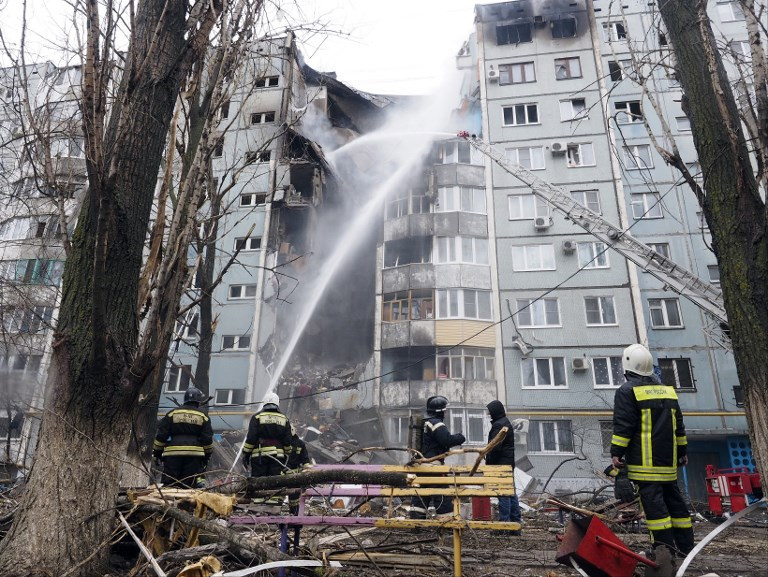Popular Reads
Top Results
Can't find what you're looking for?
View all search resultsPopular Reads
Top Results
Can't find what you're looking for?
View all search resultsRescuers pull baby alive from Russian block after gas blast
Change text size
Gift Premium Articles
to Anyone
 Firefighter work to extinguish a fire after blast that led to the partial collapse of a building in Volgograd on December 20, 2015. At least eight people were injured on December 20 in a gas explosion that led to the partial collapse of an apartment building in the southern Russian city of Volgograd, Russia's investigative committee said.
(AFP/Dmitry Rogulin )
Firefighter work to extinguish a fire after blast that led to the partial collapse of a building in Volgograd on December 20, 2015. At least eight people were injured on December 20 in a gas explosion that led to the partial collapse of an apartment building in the southern Russian city of Volgograd, Russia's investigative committee said.
(AFP/Dmitry Rogulin )
R
ussian rescuers on Tuesday pulled a baby girl alive from the ruins of an apartment block that collapsed in a gas explosion more than a day earlier, amid freezing temperatures.
"The rescuers heard crying. The baby was saved by being in a cradle and warmly wrapped up," Chelyabinsk regional governor Boris Dubrovsky wrote on his Telegram channel.
The baby girl aged 11 months was taken to hospital and is now being checked for fractures, a medic at the hospital where she is being treated told TASS news agency.
"The little girl is conscious. The prognosis is positive."
Part of the 10-storey appartment building collapsed following a gas explosion on Monday morning in the industrial city of Magnitogorsk, nearly 1,700 kilometers (1,050 miles) east of Moscow in the Ural mountains.
The baby was found after rescuers were forced to temporarily halt the search for dozens of missing people in the rubble for fear the rest of the block could come down.
The child survived temperatures that fell overnight to around minus 27 degrees celsius (minus 16 degrees Fahrenheit), TASS reported.
So far the incident has claimed at least seven lives and only six survivors have been found, including a 13-year-old boy.
The Soviet-era appartment block was home to around 1,100 people. The blast completely destroyed 35 flats while 10 more were damaged. Residents left homeless were evacuated to a nearby school.
Battling the freezing temperatures, rescuers had worked through the night combing through debris and trying to stabilise the remaining walls.
But on Tuesday morning, the head of Russia's emergencies ministry, Yevgeny Zinichev, said the operations had to be temporarily halted.
There is a "real threat of part of the building collapsing", Zinichev said.
"It's impossible to continue working in such conditions."
He added that efforts to stabilise the walls could take up to 24 hours, with emergency workers dismantling the building from the outside while hanging from cranes.
After an all-night search, officials said Tuesday morning they had found seven bodies, all of them adults, while another 37 people remained unaccounted for.
Day of mourning
The regional governor Boris Dubrovsky announced a day of mourning on January 2, with flags lowered and entertainment events cancelled, as the disaster toll set a sombre mood in Russia where New Year's Eve celebrations are the biggest annual festivities.
President Vladimir Putin on Monday rushed to the scene, where the blast left hundreds of residents homeless in freezing temperatures.
"It is in the character of our people, despite New Year's festivities, to remember to think of the dead and wounded at this moment," a grim-looking Putin said.
National television showed rescue workers searching through mangled heaps of concrete and metal.
"I went out to have a cigarette at quarter-to-six," a local man told Russian television. "There was a blast and a wave of fire... then people started running out."
Other witnesses said the explosion was strong enough to shatter the windows of nearby buildings.
"I woke up and felt myself falling. The walls were gone. My mother was screaming and my son had been buried," said another witness.
Located in the mineral-rich southern Urals region, Magnitogorsk, with a population of more than 400,000 people, is home to one of the country's largest steel producers.
Investigators have opened a criminal probe into the accident, with the FSB security service confirming the blast was the result of a gas explosion.
Such deadly gas explosions are relatively common in Russia where much of the infrastructure dates back to the Soviet era and safety requirements are often ignored.









